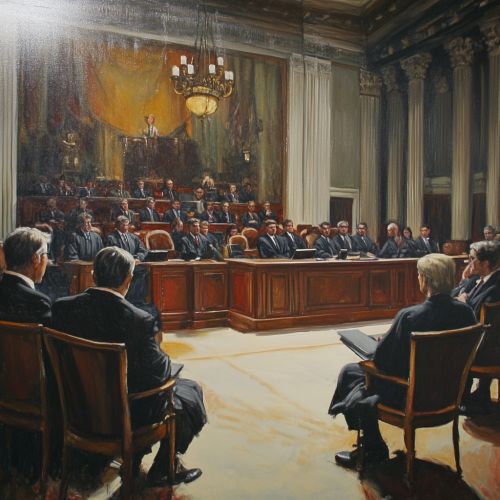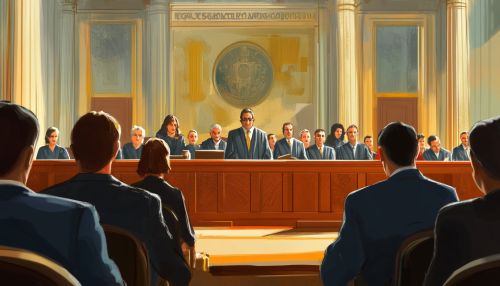Central Hudson Gas & Electric Corp. v. Public Service Commission
Background and Context
The case of Central Hudson Gas & Electric Corp. v. Public Service Commission is a landmark decision by the Supreme Court of the United States that addressed the regulation of commercial speech under the First Amendment to the United States Constitution. The decision, rendered in 1980, established a four-part test for determining when restrictions on commercial speech violate the First Amendment. This test has since become a critical component in the analysis of commercial speech cases.
The case arose in the context of the 1970s energy crisis, during which the Public Service Commission of New York (PSC) implemented a regulation prohibiting electric utilities from advertising that promoted the use of electricity. This regulation was intended to conserve energy during a time of shortage. Central Hudson Gas & Electric Corporation challenged the regulation, arguing that it violated their First Amendment rights.
The Legal Framework
Commercial Speech
Commercial speech, which is defined as speech that proposes a commercial transaction, occupies a unique position in First Amendment jurisprudence. Unlike political speech, which receives the highest level of protection, commercial speech is afforded a lesser degree of protection. The rationale for this distinction is that commercial speech is more durable and less likely to be chilled by regulation, and it serves the economic interests of the speaker.
The First Amendment
The First Amendment of the United States Constitution provides that "Congress shall make no law... abridging the freedom of speech, or of the press." This protection extends to the states through the Fourteenth Amendment. The Supreme Court has interpreted the First Amendment to protect not only the expression of ideas but also the dissemination of information, including commercial information.
Case Details
Facts of the Case
In response to the energy crisis, the PSC of New York issued an order in 1973 that prohibited electric utilities from advertising that promoted the use of electricity. The order was part of a broader effort to conserve energy and reduce demand. Central Hudson Gas & Electric Corporation, an electric utility company, challenged the order, arguing that it violated their First Amendment rights by restricting their ability to communicate with consumers.
Procedural History
Central Hudson filed a lawsuit in the New York State courts, seeking to have the PSC's order declared unconstitutional. The trial court upheld the regulation, and the decision was affirmed by the Appellate Division of the New York Supreme Court. Central Hudson then appealed to the United States Supreme Court, which granted certiorari to hear the case.
The Supreme Court's Decision
Majority Opinion
The Supreme Court, in an 8-1 decision, struck down the PSC's regulation as unconstitutional. The majority opinion, authored by Justice Lewis F. Powell Jr., established a four-part test for determining the constitutionality of restrictions on commercial speech. This test, known as the Central Hudson test, is as follows:
1. **The speech must concern lawful activity and not be misleading.** 2. **The asserted governmental interest must be substantial.** 3. **The regulation must directly advance the governmental interest asserted.** 4. **The regulation must not be more extensive than necessary to serve that interest.**
The Court found that while the PSC's interest in energy conservation was substantial, the regulation did not directly advance that interest in a manner that was not more extensive than necessary. The regulation was deemed to be an overbroad restriction on speech.
Dissenting Opinion
Justice William H. Rehnquist was the sole dissenter in the case. He argued that the regulation was a reasonable means of addressing the energy crisis and that the government should have greater latitude to regulate commercial speech in the interest of public welfare.
Impact and Significance
The decision in Central Hudson Gas & Electric Corp. v. Public Service Commission has had a profound impact on the regulation of commercial speech in the United States. The Central Hudson test remains the standard for evaluating restrictions on commercial speech, and it has been applied in numerous subsequent cases.
The case is significant for its recognition of the importance of commercial speech and the need to balance the interests of free expression with the government's interest in regulation. It underscores the principle that restrictions on speech must be carefully tailored to serve legitimate governmental interests without unnecessarily infringing on First Amendment rights.
Subsequent Developments
In the years following the Central Hudson decision, the Supreme Court has continued to refine its approach to commercial speech. The Court has emphasized the need for a careful and fact-specific analysis in each case, and it has struck down regulations that fail to meet the Central Hudson test.
The decision has also influenced the development of First Amendment jurisprudence in other areas, including the regulation of advertising and marketing practices. It has served as a foundation for the protection of commercial speech in the digital age, as new forms of communication and advertising have emerged.
See Also
- First Amendment to the United States Constitution
- Commercial Speech
- Supreme Court of the United States


